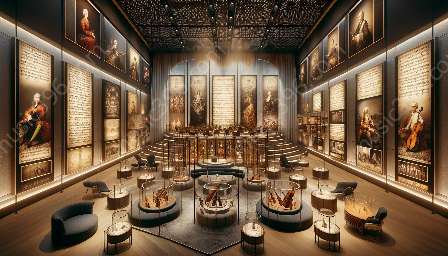In the world of Western classical music, the role of the conductor holds great significance in the performance of orchestral and choral works. Over the centuries, the conductor's role has evolved and expanded, shaping the way Western classical music is performed and experienced. This topic cluster explores the historical, technical, and artistic evolution of the conductor's role and its impact on the evolution of Western classical music, shedding light on its importance in the field of musicology.
The Historical Evolution
The conductor's role in Western classical music has undergone significant changes throughout history. In the Baroque era, the concept of a separate conductor was virtually non-existent, as composers often led performances from the keyboard or directed from the concertmaster's position. The role of the conductor as a separate entity began to emerge in the late 18th century with the rise of larger orchestras and more complex compositions, particularly with the works of composers such as Haydn and Mozart.
As the 19th century unfolded, the conductor's role became increasingly defined and prominent, with figures such as Felix Mendelssohn and Hector Berlioz influencing the development of conducting techniques and the establishment of the modern conductor's role. The era also saw the emergence of celebrated conductor-composers, such as Richard Wagner and Gustav Mahler, whose influential conducting styles left a lasting impact on the performance practices of their time.
Technical and Artistic Evolution
The evolution of the conductor's role also encompassed significant technical and artistic developments. Conducting techniques evolved from basic time-beating gestures to more elaborate and expressive movements, allowing conductors to convey nuanced interpretations and express their artistic vision. The introduction of the baton as a standard conducting tool played a pivotal role in enhancing the precision and clarity of a conductor's gestures, leading to a more cohesive and unified performance from orchestras and choirs.
Furthermore, the demands placed on conductors expanded as Western classical music repertoire grew in complexity and diversity. Conductors were required to possess a deep understanding of historical performance practices, stylistic nuances, and interpretive approaches across different musical periods, from the Baroque to the contemporary era. This evolution led to the professionalization of conducting as a specialized skill set, with educational institutions and conservatories offering comprehensive training programs for aspiring conductors.
Impact on the Evolution of Western Classical Music
The evolution of the conductor's role has had a profound impact on the evolution of Western classical music. Conductors served as interpreters and custodians of musical tradition, shaping the performance practices and stylistic interpretations of various composers' works. Their influence extended beyond the podium, as conductors often championed the works of lesser-known composers, facilitated the revival of neglected masterpieces, and collaborated with contemporary composers to premiere new works.
Moreover, the development of orchestral conducting allowed for the realization of larger, more ambitious musical compositions, enabling composers to explore complex orchestration, innovative harmonic language, and symphonic structures. The conductor's role as a mediator between composers and performers played a pivotal part in translating composers' intentions into tangible musical experiences, enriching the repertoire and contributing to the advancement of Western classical music.
Significance in Musicology
Within the field of musicology, the evolution of the conductor's role holds significant importance. Conducting practices and traditions provide valuable insights into historical performance styles, performance conventions, and interpretive approaches. Musicologists examine the conducting techniques of different eras, analyze historical recordings, and study the written annotations of renowned conductors to gain a deeper understanding of the evolving musical interpretations and performance traditions.
Furthermore, the study of prominent conductors and their impact on the performance history of specific compositions offers valuable scholarly contributions to the field of musicology. Through interdisciplinary research, musicologists explore the intersection of conducting, music theory, historical context, and cultural influences, shedding light on the multifaceted relationships between conductors, performers, and the musical repertoire across different periods and genres.
Conclusion
The evolution of the conductor's role in Western classical music performance is a multifaceted and rich topic that encompasses historical, technical, artistic, and scholarly dimensions. By delving into this evolution, we gain a deeper appreciation for the vital role conductors have played in shaping the interpretation, dissemination, and preservation of Western classical music. This exploration also underscores the enduring relevance of the conductor's role within the broader context of the evolution of Western classical music and the field of musicology.



















